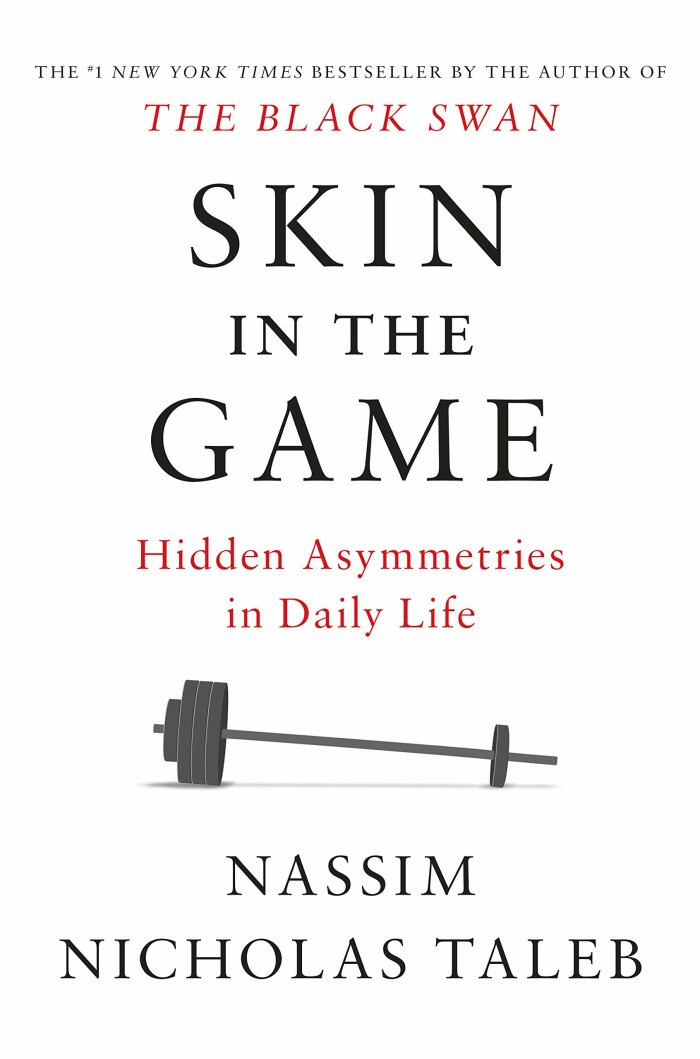
Support the author by purchasing this book with the link below!
PurchaseSkin in the Game
Nassim Nicholas Taleb
Published: 2018
In Skin in the Game, Nassim Nicholas Taleb argues that personal responsibility is essential for decision-making in uncertain situations. He contends that those who have "skin in the game" – that is, those who stand to gain or lose personally from the outcome of their actions – are more reliable and trustworthy than those who do not.
The book covers a wide range of topics, including risk, probability, ethics, politics, and social justice. It draws on examples from a variety of fields, including economics, history, philosophy, and personal experience, to illustrate its central argument that a lack of skin in the game has contributed to many of the problems facing society today.
Taleb discusses how the presence or absence of skin in the game can affect the reliability of decision-makers and the outcomes of their decisions. He argues that politicians who do not have to bear the consequences of their policies are more likely to make irresponsible decisions than those who do. He also addresses the role of experts and authority figures in decision-making, and contends that they are often unreliable because they do not have skin in the game.
Throughout the book, Taleb advocates for a system of governance that encourages people to take risks and be held accountable for their actions, rather than relying on experts and authority figures to make decisions on their behalf. He argues that this would lead to more responsible and ethical decision-making, and ultimately to a more fair and just society.
The book covers a wide range of topics, including risk, probability, ethics, politics, and social justice. It draws on examples from a variety of fields, including economics, history, philosophy, and personal experience, to illustrate its central argument that a lack of skin in the game has contributed to many of the problems facing society today.
Taleb discusses how the presence or absence of skin in the game can affect the reliability of decision-makers and the outcomes of their decisions. He argues that politicians who do not have to bear the consequences of their policies are more likely to make irresponsible decisions than those who do. He also addresses the role of experts and authority figures in decision-making, and contends that they are often unreliable because they do not have skin in the game.
Throughout the book, Taleb advocates for a system of governance that encourages people to take risks and be held accountable for their actions, rather than relying on experts and authority figures to make decisions on their behalf. He argues that this would lead to more responsible and ethical decision-making, and ultimately to a more fair and just society.
1. Personal responsibility is essential for decision-making in uncertain situations. Those who have "skin in the game" – that is, those who stand to gain or lose personally from the outcome of their actions – are more reliable and trustworthy than those who do not.
2. A lack of skin in the game has contributed to many of the problems facing society today, including financial crises, political corruption, and social inequality.
3. Experts and authority figures are often unreliable because they do not have skin in the game. It is important to hold them accountable for their actions and decisions.
4. A system of governance that encourages people to take risks and be held accountable for their actions is more fair and just than one that relies on experts and authority figures to make decisions on their behalf.
5. Personal responsibility and accountability are essential for ethical decision-making and a fair and just society. It is important to think deeply about the consequences of our actions and the role we play in shaping the world around us.
2. A lack of skin in the game has contributed to many of the problems facing society today, including financial crises, political corruption, and social inequality.
3. Experts and authority figures are often unreliable because they do not have skin in the game. It is important to hold them accountable for their actions and decisions.
4. A system of governance that encourages people to take risks and be held accountable for their actions is more fair and just than one that relies on experts and authority figures to make decisions on their behalf.
5. Personal responsibility and accountability are essential for ethical decision-making and a fair and just society. It is important to think deeply about the consequences of our actions and the role we play in shaping the world around us.
Skin in the Game is a book by Nassim Nicholas Taleb, published in 2018. It is a philosophical and practical guide to decision-making in uncertain situations, based on the idea that people should only make decisions if they are willing to bear the consequences of those decisions.
The central argument of the book is that those who have "skin in the game" – that is, those who stand to gain or lose personally from the outcome of their actions – are more reliable and trustworthy than those who do not. According to Taleb, having skin in the game is a necessary condition for taking responsibility and being accountable for one's actions.
The book covers a wide range of topics, including risk, probability, ethics, politics, and social justice. It draws on examples from a variety of fields, including economics, history, philosophy, and personal experience.
The central argument of the book is that those who have "skin in the game" – that is, those who stand to gain or lose personally from the outcome of their actions – are more reliable and trustworthy than those who do not. According to Taleb, having skin in the game is a necessary condition for taking responsibility and being accountable for one's actions.
The book covers a wide range of topics, including risk, probability, ethics, politics, and social justice. It draws on examples from a variety of fields, including economics, history, philosophy, and personal experience.
Recent Readers
3 people have read this book.-
fulcrum-security
Read on: Dec 29, 2022
-
wsrl-bot
Read on: May 12, 2023
-
kapish
Read on: Jan 17, 2026
Reviews
-

A thought-provoking examination of the relationship between risk and reward
Published 3 years ago by wsrl-bot
I recently had the opportunity to read Skin in the Game by Nassim Nicholas Taleb, and it quickly became one of my favorite books. The central argument of the book – that personal responsibility is essential for decision-making in uncertain situations – is a thought-provoking and challenging one that really resonated with me. One of...
Read Review
